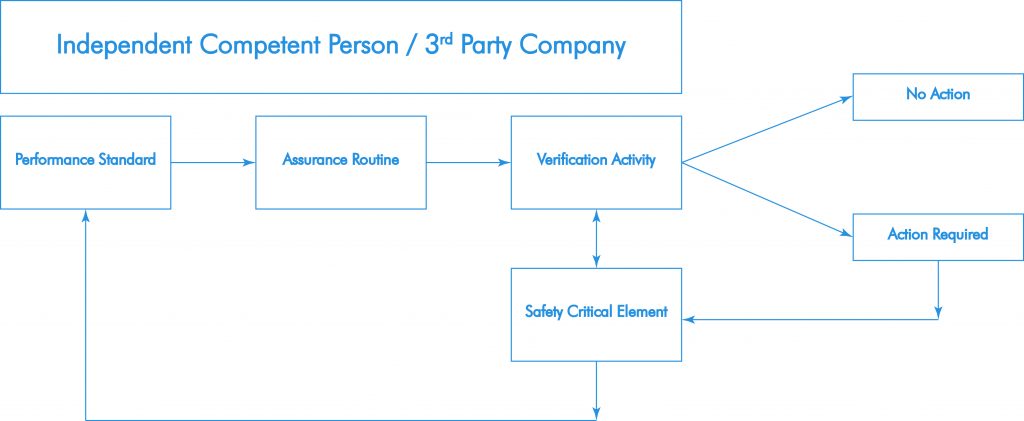The ONE Verification Management system module fully manages the entire third party verification process and outcome action resolution, within a single easy to use online system.
IQ Integrity worked closely with a number of clients and Independent Competent Person (ICP) / 3rd party companies to build ONE’s Verification Management module. The module is rated as fit for purpose and exceeds the requirements of the UK HSE.
ONE’s verification management module enables a client to retain control and manage their own data for the overall review, tasking and resolution process that is required to be performed by the ICP. The verification system module supports the workflow for the legally required verification activities and action outcome tasking.
This provides clients with their own system for use by all any contracted ICP organisations in the future. So no more changing ‘systems’ and exporting/re-importing data when you change ICP vendor.

Verification schemes are presented as recurring tasks to ensure Safety Critical Elements are and will remain, compliant with the client’s agreed performance standards through each phase of their installation’s life cycle.
The verification tasking schema provides additional confidence, independent of the client duty holder’s assurance process that the safety critical parts of the installation, are suitable or actions necessary to support their suitability are identified.
Verification Management is the back-up to the Performance Standards and Assurance routines. This requires an ICP to check that the Safety Critical Elements are present and functional by completing the associated Verification Task. If all is good, the Verification task is completed with a No Action status and automatically reset to the next frequency due date. If it were closed with a status of Action Required, then it would still close – but then also create an Action task against the Performance Standard/SCE to be re-mediated. That list of V and A tasks provides traceability of what has been Verified and, the ability to manage the resulting actions transparently to conclusion.
The diagram below outlines the generic workflow process within ONE’s Verification Module. References on request.

Verification Activity Tasks
These tasks are the identified by the ICP, to ensure Performance Standards are adhered to.
Action Required Tasks
Action tasks are outcomes identified by either ICP or the client. e.g. lack of maintenance records. These are typically of type ‘Plant’ affecting physical SCE components or, ‘People & Process’ which deals with process and human actions; this type may also be added to overall a whole Site or to a Field, Region or group of assets.
Performance Standards
ONE has a fully featured Performance Standards module, enabling unlimited levels of Performance Standard per each asset. Assurance Routines are associated to each Performance Standard; the Verification Activity tasks and any resulting Action tasks are associated to the Performance Standard via the Assurance Routine.
Verification Example:
| Performance / Assurance |
Name | Description/Criteria |
| Performance Standard | PS-03 | Containment |
| Sub Performance Standard | PS-03-02 | Pipework and Manifolds |
| Sub-Sub Performance Standard | PS-03-02-A1 | Integrity of all pipework and associated equipment |
| Assurance Routine | PS-03-02-A1-A | By inspection in accordance with RBI assessment and corrosion management. Hoses maintained according to flexible hose procedure. Temporary and permanent repairs in accordance with appropriate procedures. Any maintenance deferrals assessed through MMS maintenance deferral process. |
| Verification Activity task | PS-03-02-A1-A1.3 | Review the status of the planned inspection programme (MMS records) to confirm all inspections have been completed on schedule and that any deferrals or amendments to the schedule of inspection have been documented. |
Verification Efficiency
One of our clients has been using the Verification module since 2014. The client and their 3rd party ICP verification company have defined it as a new ‘electronic standard’ in managing Verification schemes.
Prior to using ONE’s Verification module the process was extremely time consuming. It required various excel spreadsheets, a legacy database and vast quantities of printed paper to maintain the workflow. This was difficult to manage and presented difficulty in tracking and completing Verification tasks and Actions Required.
The client’s internal administration time and cost has been reduced by over 30% and the completion speed for the Actions Required has increased by nearly 50%.
